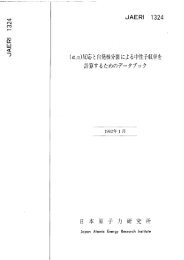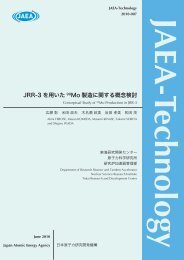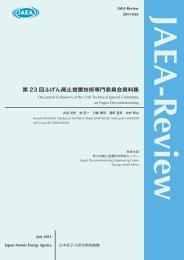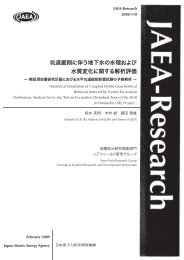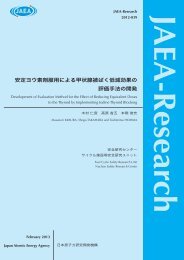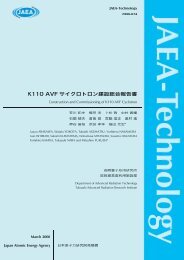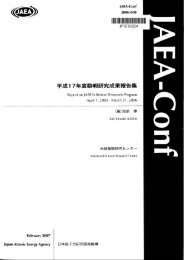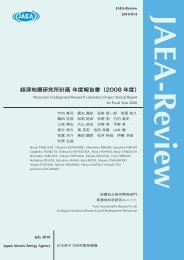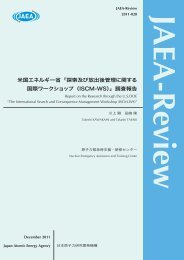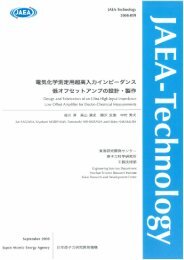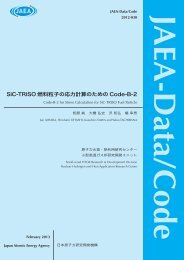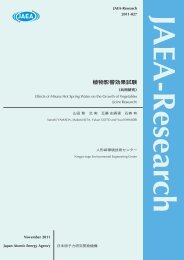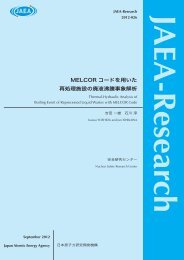JAEA-Conf 2011-002 - 日本原子力研究開発機構
JAEA-Conf 2011-002 - 日本原子力研究開発機構
JAEA-Conf 2011-002 - 日本原子力研究開発機構
You also want an ePaper? Increase the reach of your titles
YUMPU automatically turns print PDFs into web optimized ePapers that Google loves.
<strong>JAEA</strong>-<strong>Conf</strong> <strong>2011</strong>-<strong>002</strong><br />
The main conclusion of the group of international experts was: “The INRNE obtained many<br />
important achievements in all its areas of investigations both in pure and applied science.<br />
INRNE is currently well placed in the national and international context, having gained<br />
considerable experience in international collaborations”. It was recommended that links with<br />
industry need developing and strengthening. Given the number of products already developed<br />
by INRNE for practical applications, this should be quite achievable.<br />
In the thematic plan of the Institute for 2009 11 projects were devoted to fundamental<br />
problems and 12 projects to nuclear safety, applied and environmental problems. This balance<br />
between fundamental and applied research resulted from our strategy, clearly defined several<br />
years ago to be in accordance with the national and EC priorities. Almost half of the<br />
developments concerns problems related to the scientific background of the national nuclear<br />
energy production, radioactive waste treatment monitoring and management of the<br />
environment. Of 23 projects 14 are supported by national and 9 additionally by international<br />
organizations. The results of our research were published in 432 papers including 4 in<br />
scientific books and monographs, 221 journal articles, 201 reports in proceedings of<br />
international conferences and symposia, and 6 in popular science articles and books.<br />
Large amount of these results have been obtained in close collaboration with international<br />
and foreign centers, universities and other institutions. INRNE is a part of a very large number<br />
of national and international collaborations in all its areas of activity. Most of these<br />
collaborations are with leading European and international institutes and laboratories like<br />
IAEA, JINR, CERN, DESY, CNRS, INFN and others. The reconstruction and modernisation<br />
of the storage facility at Novi Han was chosen by IAEA as a model for the reconstruction of<br />
all similar facilities in South-East Europe. The Basic Environmental Observatory (BEO) is a<br />
Centre of Excellence and is an infrastructure of pan-European importance. The collaborations<br />
with 5 from 7 Institutes of the Joint Research Center (JRC) of the EC play extremely<br />
important role for the effective participation of INRNE in big EC projects of the 6FP and 7FP.<br />
INRNE was awarded 1st prize within FP6 for the most active scientific team. Taking into<br />
account the importance of the scientific collaborations in attempt to preserve the high<br />
scientific level of the research, in 2009 the staff of INRNE proposed 9 projects in the frame<br />
of FP7 of EC–4 of the proposals were accepted (5 under evaluation). The scientific contacts<br />
became stronger and more efficient due to 9 international conferences, organized by INRNE<br />
during 2009. The membership of Bulgaria in EURATOM fusion program in 2009 is very<br />
successful. All projects reached the planned milestones. In 2009 some very significant<br />
contracts have been signed: project SPIRAL-2 with National Large Heavy Ion Accelerator<br />
(GANIL), with CEA, France and SEVAN with Erevan Physical Institute. The cycle of<br />
activities connected with our participation in CMS experiment of the LHC collider is<br />
successfully finished and the correspondent part of the detectors and connected electronic<br />
channel, designed and produced in Bulgaria were put in operation. Serious scientific results<br />
were obtained within the frame of MAGIC collaboration with active participation of<br />
scientists from INRNE.<br />
The scientific experimental facilities of INRNE also made essential progress.<br />
Environmental Impact Assessment Report for the investment proposal for conversion and<br />
reconstruction of the research reactor IRT-2000 was developed and approved by Ministry of<br />
Environment and Water of Bulgaria. The whole cycle of planning, execution and assessment<br />
of the accomplished work concerning the partial dismantling of the IRT research reactor is<br />
completed. All these activities were fulfilled with the expert help by the IAEA, in cooperation<br />
with Argonne National Laboratory and with the financial help of the USA Department of<br />
Energy. In 2009 BEO “Moussala” has been confirmed as regional station for South-East<br />
Europe in Global Atmospheric Watch World program.



